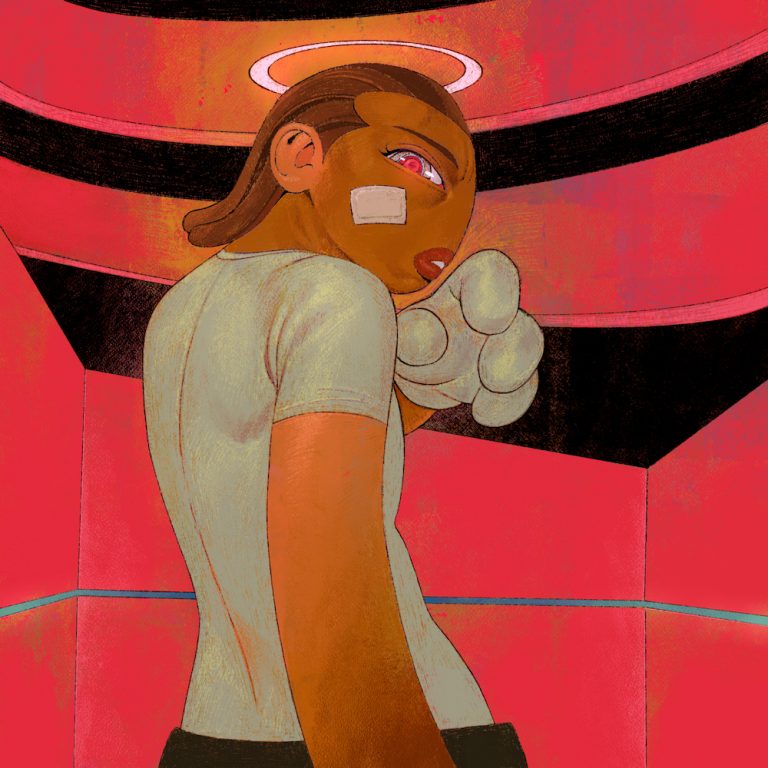It’s coincidental, but the halves of McKinley Dixon’s name can be linked to two Williams. Killed by an assassin, President William McKinley reaffirmed the gold standard and oversaw the war-enabled dawn of global, American imperialism in both hard and soft power. William “Willie” Dixon was the “poet laureate” of the Chicago blues, a totemic and pivotal figure whose songs sowed the seeds of the British Invasion and all that came after.
Yet Dixon – a rapper from equal parts Annapolis, Richmond, and now based in Chicago – keeps his masculine forbearers at arm’s length. Both constantly looked overseas, but McKinley Dixon wants to focus on America’s chronic inner struggles and looks to a different laureate – a female and mother with his same concerns on BELOVED! PARADISE! JAZZ!? – Toni Morrison.
Drawing the title from three of her best-known novels (set years ago in the South, Oklahoma, and Harlem, respectively), Dixon tries to find his identity in the context of oppressed culture and violent surroundings. On the opening track, he quotes – via poet/critic Hanif Abdurraqib – a passage from Harlem where hoodlums felt a sense of pride if they happened to get shot the day the Black doctor was on duty at the emergency room. And so goes BELOVED!, caught repeatedly dreaming while the bullets fly and gliding above the wreckage while someone tries to jack it for its shoes.
Like both Morrison’s books and Dixon, BELOVED!’s geography needs ironing out. In the notes, Dixon says visits to New York City as a youth created an idea in him that the Big Apple was an escapist’s paradise. The Harlem Renaissance remains a watershed in African-American cultural history, but interestingly BELOVED! often finds itself four miles across Central Park and on Broadway. Thematic and lyrical motifs find repetition throughout the album like a musical director slowly pulling the strings together.
The jazz as well doesn’t quite stem directly from the hot and sweet forms of the Roaring ‘20s, but rather Dixon’s adopted home in Chicago and the live-instrumentation hip-hop favored by Common, Lupe Fiasco (the opening of “Tyler, Forever” recalls “Real”), and now Jamila Woods. At times, Dixon revels in the vibrant arrangements like a caped, late-’70s James Brown taking a break and letting Lyn or Martha lead.
Following a Morrison prologue, Dixon begins “Sun, I Rise”, “How I could underestimate sun? / How I coulda been so blind from the light that it brung?” However, it isn’t long until he begins reconciling humanity’s craving for power and its potential for greatness. “Feening for that fleeting feeling of warmth . . . Now it’s time for us to find out what other suns exist.” Later, in “Run, Run, Run,” he imagines himself as Icarus soaring above a playground shootout and in love with the world, but on “Tyler, Forever” a friend’s death by streetlife shatters him: “Mama said this lifestyle shoulda been outgrown.”
The rough transition from “Sun, I Rise” to “Mezzanine Tippin’” recalls the similarly jarring sequence from Kendrick Lamar’s “Bitch, Don’t Kill My Vibe” into “Backseat Freestyle”, and where Lamar was quite literal with pleasures of the flesh Dixon feels like he can keep one hand on his gold chain and one hand on the sun. Following the tragedy of “Tyler, Forever,” he finds himself confessing to flowers who listen without judging him. Abdurraqib returns to repeat the Morrison segment and this appears to release Dixon from all that locks him to the earth.
“The Story So Far” embraces life’s confusion, struggle, and ambiguity, feeding into the closing title track with swagger. “I was once nothing / then a heart sprang out from the fist,” the album begins to end, “’Cause if the heart pulls the rest up at the seams / Then that fist gon’ grab something that could tip the balance beam.” He returns – like he did on his debut – to his mothers, be they biological or Nobel winners. “When I was standing on the edge about to fall off that cliff / What kept me on was looking up and seeing my hand in your grip.”

